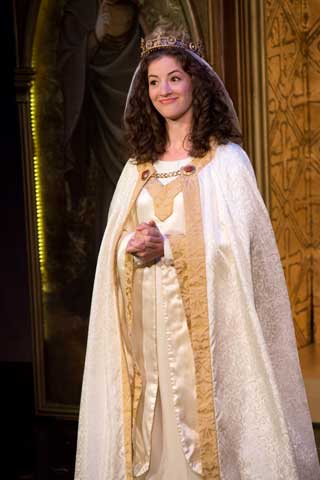Play (2014)
by Jane Anderson
Directed by Matthew Penn
Shakespeare & Company
Elayne P. Bernstein Theatre
Lenox, MA
July 30 – September 6, 2015
With Elizabeth Aspenlieder (Lady of the Court), Jason Asprey (Father Gilbert), Nigel Gore (Jacques Arc), Nathaniel Kent (Pierre Arc), Tina Packer (Isabelle Arc), Bridget Saracino (Saint Catherine), Anne Troup (Joan Arc)

Nigel Gore as Jacques Arc
in “Mother of the Maid”
Photo by Enrico Spada
Courtesy of Shakespeare & Company
In the original 2000 Year Old Man (1961) comedy routine by Mel Brooks and Carl Reiner, Brooks’ 2000 year old man, asked about whether he ever knew Joan of Arc responds I went with her, dummy. But, she wanted to save France, so I said ‘Look, you save France, I’ll go wash up.’ It’s a gag poking fun at the courageously single-minded Maid’s devotion to her cause, but not, in its skeptical essence, too far removed from the humanistic perspective conveyed by Mother of the Maid.
Interpreted with her usual passion and astounding thoroughness, Tina Packer offers a heartfelt and persuasive account of what it might have been like to be Joan of Arc’s mother.
Needless to say, the actual role of Joan’s mother would have been challenging. A young teenager, swept up in an intense vision, laden with a kind of adolescent fury, about a religiously inspired nationalistic venture, is enough to drive any parent to the edge.
Played with compelling gusto and verve, Anne Troup’s portrait of Joan is yet at once believable, inspiring and down to earth. While indeed seeming like an adolescent with a fervent obsession, Troup also makes one think that Joan is, as well, a true visionary.

Anne Troup as Joan Arc
in “Mother of the Maid”
Photo by Enrico Spada
Courtesy of Shakespeare and Company
The play does suggest, however, that Joan’s parents think, especially at first, that she is emotionally, if not psychologically, over the edge. Her father, Jacques (Nigel Gore), initially questions Joan’s whole saintly claim, thinking it mostly indulgent bunk. Her mother, Isabelle (Tina Packer), somehow follows more closely behind Joan, but really both of them are, as the play suggests, always very much more parents of, than believers in, the budding saint.
After going through an early stage of seeming out of her mind to some, and certainly in need of proving herself to those who matter, Joan is taken in by the king. Ironically, in addition to gaining validation, Joan’s newfound proximity to the throne seems to offer real perks, and her parents go through what ordinary parents do in such cases of success, pleased astonishment following questioning disbelief. When Joan suggests she can, with her new connections, get the folks some better digs, they are indeed tickled.
Yet it is the unremitting love and devotion that pervade the parental roles that are the touching core of this speculative narrative. Especially in the end, when Joan has been condemned to burn at the stake, the bending of their own beliefs to accommodate Joan’s needs is moving and equally astonishing. In anticipation of Joan’s immolation, her mother urges her daughter to find the sources of strength in the religious vision she herself has always doubted because, as her mother, she knows it will give Joan the capacity to face the awful pain she must undergo.
Both Packer and Gore make a wonderful team. Several years ago, they were a movingly evocative pair in Women of Will, Packer’s dramatic survey of female roles in Shakespeare, and they call forth the same intensities again here and do so with wit and a good dose of irony.

in ‘Mother of the Maid’
Photo by Enrico Spada
Courtesy of Shakespeare & Company
Adding additional wryness at various intervals are commentaries by St. Catherine, who, as interpreted wittily and pungently by Bridget Saracino, offers pointed comic reflection on the entire goings on.
Overall, the play is moving and heartening, and, as one must also remember, fiction. Somehow that doesn’t matter. In his great Saint Joan, George Bernard Shaw also adds narrative context which, as well, ennobles its subject while treating it with a degree of appropriate irony.
Significantly, Mother of the Maid frames a sense of the selfless grandeur of human connection, whatever one’s view of visionary spirituality might be. Through all the phases of the impassioned fervor, the play’s observation – that the terrestrial fidelity of these parents for their child is equally significant – is persuasive and moving.
– BADMan
Leave a Reply